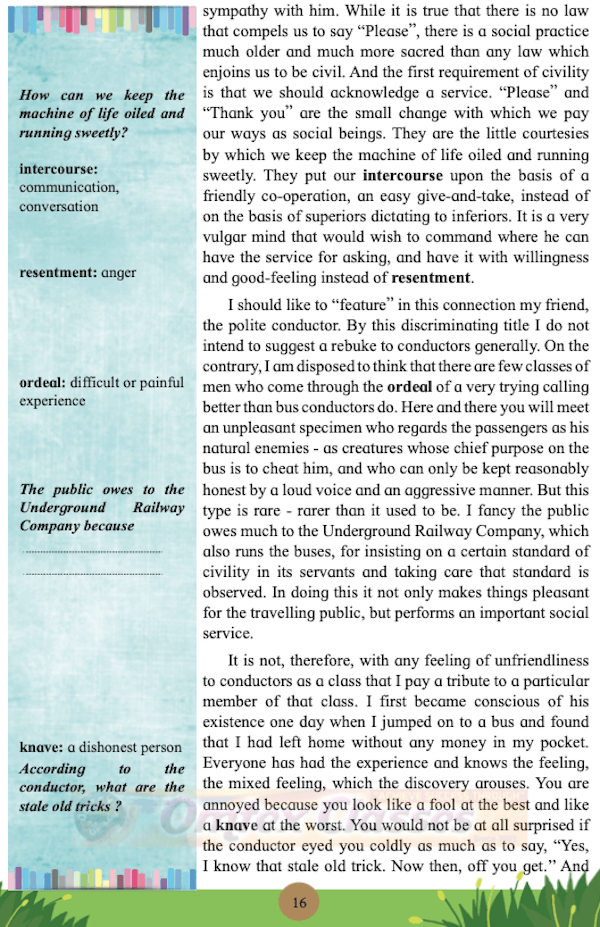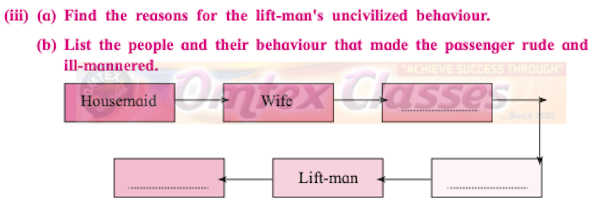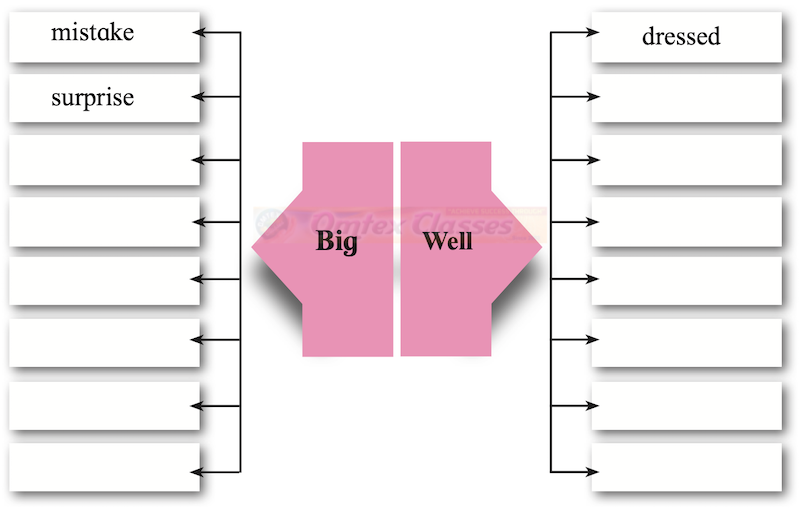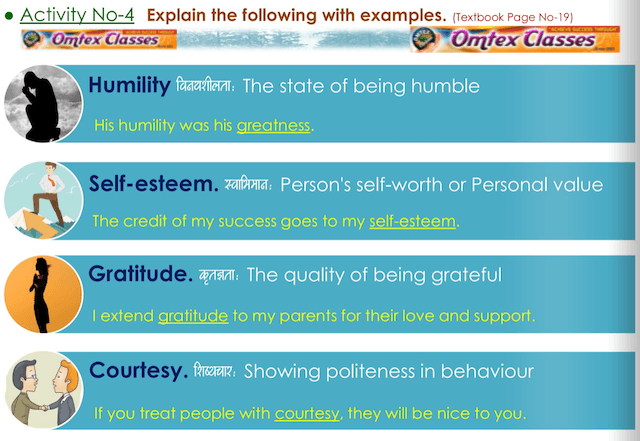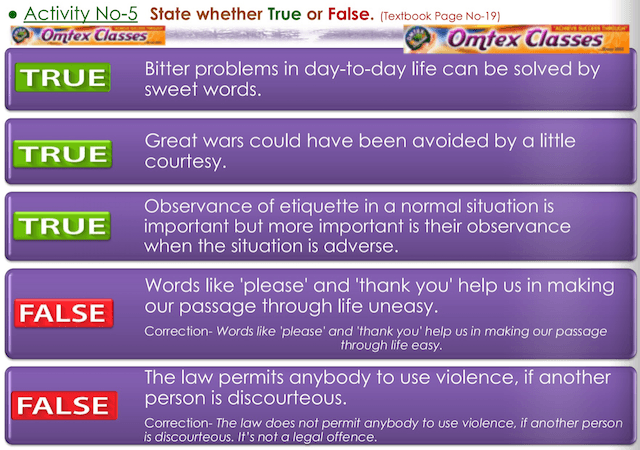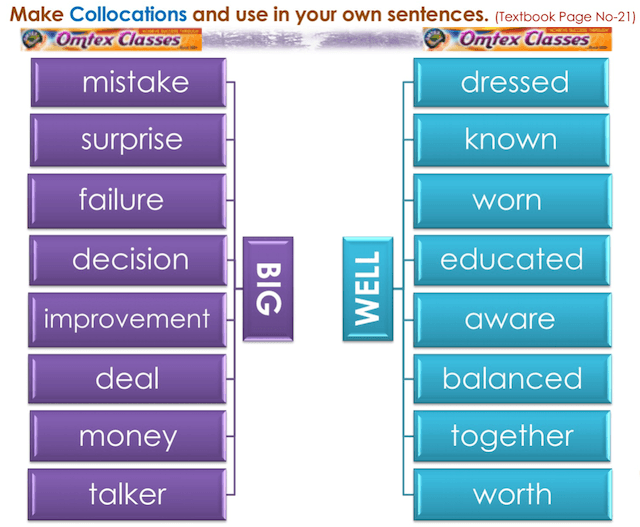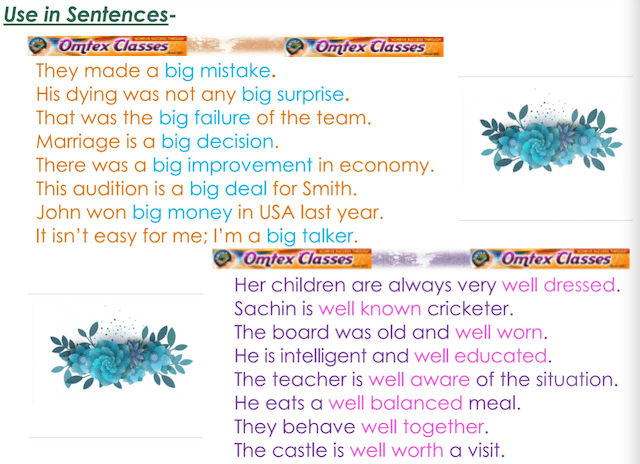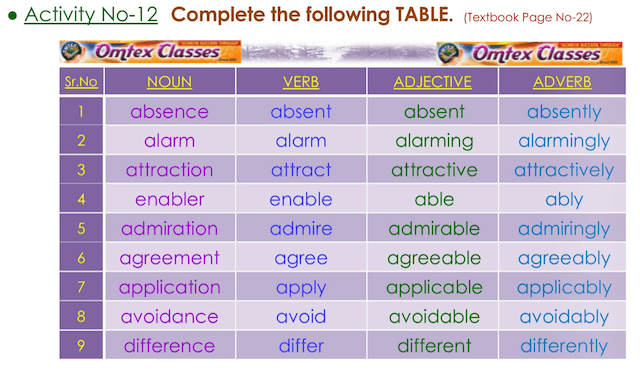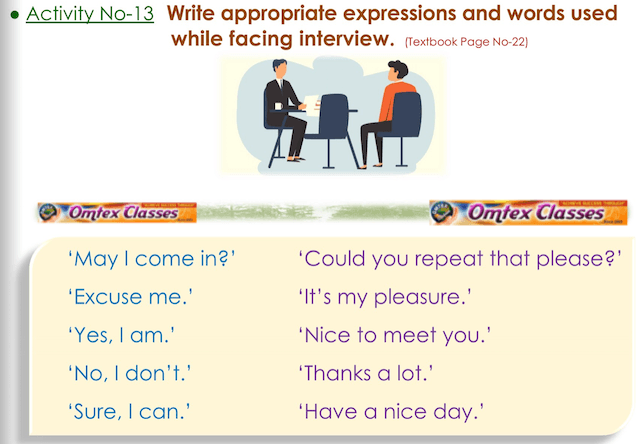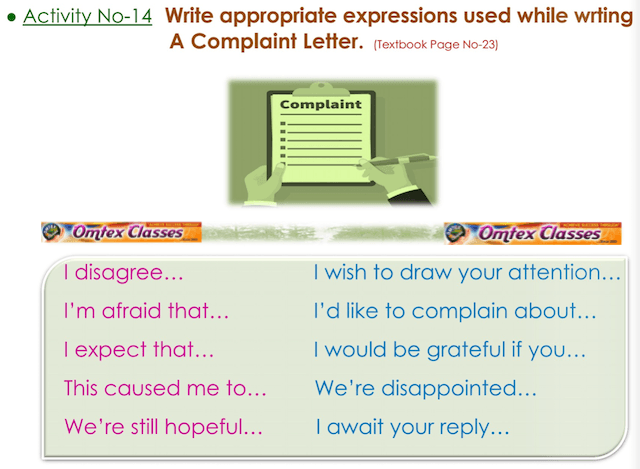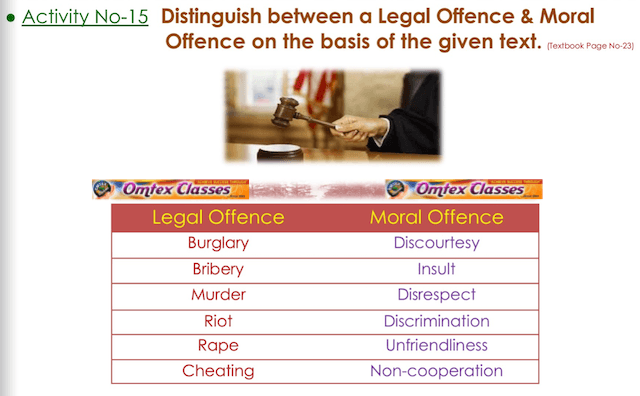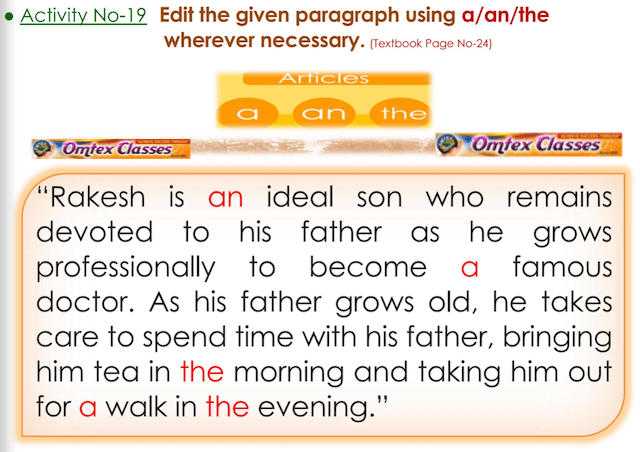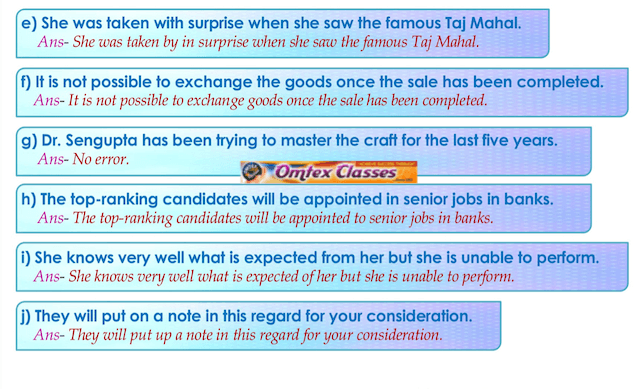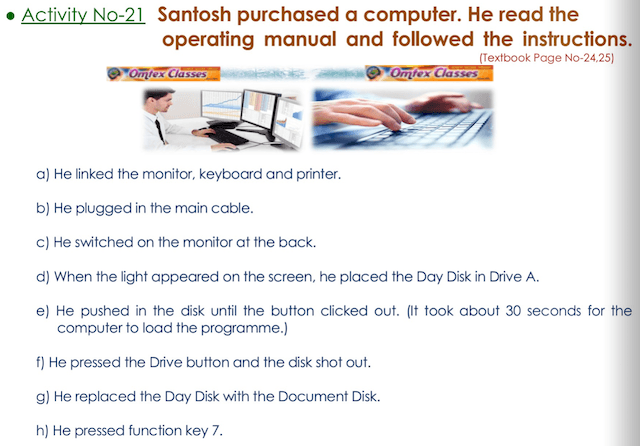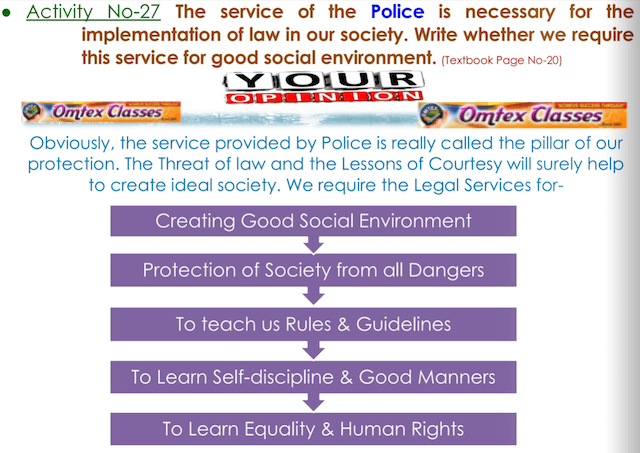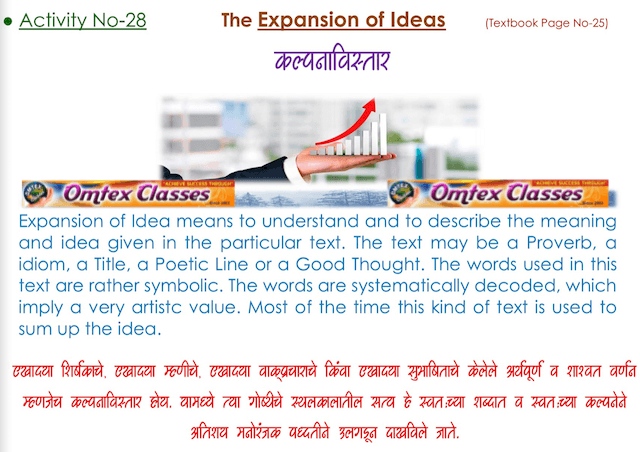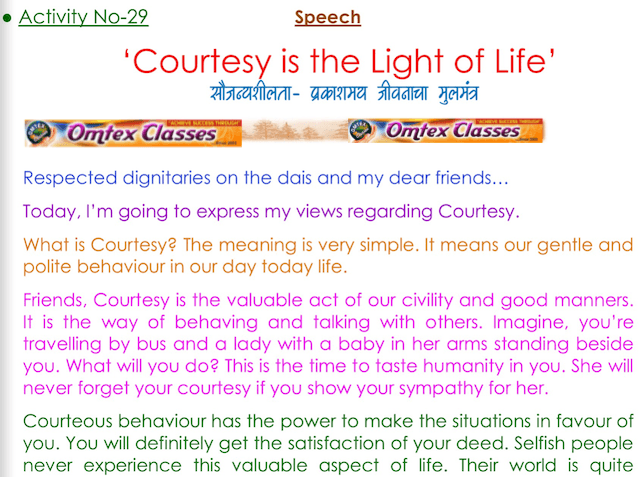Chapter 1: On Saying “Please”
1.2 On Saying ‘Please’
On Saying "Please" is really worth reading to bring a change in our social behaviour. Here, one can enjoy the writer's meticulous selection of vocabulary and complex structures. It sets a challenge in front of the readers to find contextual references of the words and phrases.
Title: The title ‘On Saying ‘Please’ gives us a hint that the topic is related to manners. We should know the importance of saying ‘ please’ to others. Good manners make us a socially accpeted person. It makes healthy relationship between individuals.
New words:-
Undoubtedly - known for certain to be so
Discourtesy - not polite, rudeness
assault and battery - an attack which includes not only threats but the actual use of violence
burglar - thief who breaks into houses shops etc with the intention of stealing
retaliate - to do something bad to someone who has done something bad to you
assailant - an attacker
legislate - to make a law or laws
violence - action or feeling that causes damage, unrest etc
to box - to fight with the fists (closed hands)
haughty - a high opinion of oneself and often a low position of others
boorish - rude, uncultured
laceration - hurt feelings
slur - a cause of blame
redress - remedy, set right
vanity - pride
brooding over - spend time thinking anxiously or sadly about something
equilibrium - balance (of the mind, emotions)
bullied - threatened
insolent - very rude
henpecked –a husband who always does what his wife tells him to do
black eye – dark coloured skin around somebody’s eye ehere he or she has been hit
endorse - official agreement to the decision
martyrdom - the death or suffering of a martyr
morose - unhappy, very sad and ill tempered
Decalogue - the Ten Commandments
Verdict - judgement
intercourse - communication, conversation
resentment - anger
ordeal - difficult or painful experience
knave - a dishonest person
cheerfully - happily
squared - having no doubt, settled
countenance - a person’s face or expression
treading - pressing down something with foot
assured - confident
inexhaustible - unlimited ,can never be finished
solicitous - caring or concerned, giving helpful care
irradiated - (here) spread or produced
uncouth - impolite, unrefined
benediction - a blessing
conciliatory - trying to win friendly feelings
panegyric - a speech or piece of writing praising someone highly
moral affront – insult, disrespect
boor - a rude insensitive person
Ice Breakers
1) List the words of courtesy that we use in our daily life. Explain the purpose of using each.
Answer:
Words and purpose:-
1) Thank you – To express gratitude
2) Excuse me – To take permission to go ahead or to ask something
3) Pardon me – To ask to repeat the words
4) May I – To take permission
5) Yes / No sir – To agree or disagree with respect - man
6) Yes / No madam - To agree or disagree with respect - woman
7) You are welcome – To accept the expression of gratitude
8) Mention not – Reply to thank you, need not to say thank you.
9) I am sorry – To tell someone that you are ashamed for hurting them, to say disagree, to oppose other’s view politely
10) My pleasure- To tell you are happy to help or do favour
2) Listed below are a few character traits of people. Some are positive traits, while others are not. Write the ones you feel are desirable or not desirable.
Answer:-
3) Etiquette and manners are very important for a person to live in the society. Read the following and write if it is appropriate or inappropriate.
1.To receive phone calls while you are in a lecture or class.
Ans: Inappropriate
2.To knock before you enter your Principal’s office.
Ans: Appropriate
3.To thank the person who offers you tea or coffee.
Ans: Appropriate
4.To be polite and courteous to others.
Ans: Appropriate
5.To leave the classroom without the teacher’s permission.
Ans: Inappropriate
6.To occupy the seats reserved for ladies or physically challenged or elderly people on a bus or a train.
Ans: Inappropriate
About the writer:
Alfred George Gardiner was an English journalist, editor and author. His essays, written under the alias "Alpha of the Plough", are highly regarded. He started his literary career as a journalist. At age of 37, he was appointed editor of the Daily News. He made regular contributions to the Daily News, The Manchester Evening News etc. His essays are uniformly elegant, graceful and humorous. ‘The Pillars of Society’, ‘Pebbles on the Shore’, ‘Many Furrows and Leaves in the Wind’ are some of his best known writings. His uniqueness lies in his ability to teach the basic truths of life in an easy and amusing manner. He rai the question of morality in everyday life.
Brainstorming
A1)
(i) Explain the following words with examples.
a) Humility : Modesty
Example- She needs the humility to accept that their way may be better.
b) Self-esteem :Self respect
Example- He got self – esteem earning sufficient money
c) Gratitude: The quality of being grateful.
Example- Students expressed their gratitude to the teachers on Teachers’ Day.
d) Courtesy: The showing of politeness in one's attitude and behaviour towards others.
Example- The manager treated the players with courtesy and good humour.
e) Generosity: The quality of being kind and generous.
Example- I was overwhelmed by the generosity of friends and neighbours.
f) Sympathy: The feelings of pity and sorrow for someone else's misfortune.
Example- They had great sympathy for the flood victims.
g)Empathy: The ability to understand and share the feelings of another.
Example- He had empathy with small children.
(A2)
(i) Read the text and state whether the following statements are True or False. Correct the False statements.
(a) Bitter problems in day-to-day life can be solved by sweet words.
Answer- True
(b) Great wars could have been avoided by a little courtesy.
Answer- True
(c)Observance of etiquette in a normal situation is important but more important is their observance when the situation is adverse.
Answer- True
(d) Words like 'please' and 'thank you' help us in making our passage through life uneasy.
Answer- False
Correct Sentence- Words like 'please' and 'thank you' help us in making our passage through life easy.
(e) The law permits anybody to use violence, if another person is discourteous.
Answer- False
Correct Sentence- The law does not permit anybody to use violence, if another person is discourteous. It’s not a legal offence.
(ii) Select the most appropriate sentences which suggest the theme of the essay.
(a) The essay tells us about courtesy, civility, morality, responsibility and control.
(b) The essay explores the difficulties that can be incurred by an individual when dealing with the public.
(c) One can keep one’s peace of mind without having to lower themselves to the level of the perceived offender.
(d) People with low self-esteem are generally difficult to work with and they look down upon others to get a feeling of superiority.
Answer-
(a) The essay tells us about courtesy, civility, morality, responsibility and control.
(c) One can keep one’s peace of mind without having to lower themselves to the level of the perceived offender.
(iii)
(a) Find the reasons for the lift-man's uncivilized behaviour.
Answer- The passenger’s discourteous behaviour, wound to self respect or vanity, slur upon (insult of) his social standing etc.
(b) List the people and their behaviour that made the passenger rude and ill-mannered.
Answer-
1) Housemade – answered back to the cook
2) cook – very rude to passenger's wife
3) Wife – employer is henpacked by his wife at breakfast
4) Employer- did not say ‘Good Morning’ to passenger
5) Liftman – expected to say ‘ Please’
6) Passenger – rude and ill - mannered towards the liftman
(iv) Good manners are required in our daily life for making our social contacts more cooperative and friendly. Illustrate the behaviour of the polite conductor with different people in various situations.
(A3)
(a) Find out the words in column 'B' which collocate with the words in column 'A'.
Answer-
A4)
(i) Edit the given paragraph using a/an/the wherever necessary.
Rakesh is a/an ideal son who remains devoted to his father as he grows professionally to become a/the famous doctor. As his father grows old, he takes care to spend time with his father, bringing him tea in a/the morning and taking him out for a/the walk in an/the evening.
Answer:
Rakesh is an ideal son who remains devoted to his father as he grows professionally to become a famous doctor. As his father grows old, he takes care to spend time with his father, bringing him tea in the morning and taking him out for a walk in the evening.
ii) Spot the errors in each of the following sentences and correct the incorrect ones.
(a) Radha brought pens and distributed them between her five children.
Ans- Radha brought pens and distributed them among her five children.
(b) Jayshree and Sujata sat besides each other in complete silence.
Ans- Jayshree and Sujata sat beside each other in complete silence.
(c) His best friend Vijay was blind within one eye.
Ans- His best friend Vijay was blind in one eye.
(d) One could dare to encroach on his rights.
Ans- One could dare to encroach upon his rights.
(e) She was taken with surprise when she saw the famous Taj Mahal.
Ans- She was taken by in surprise when she saw the famous Taj Mahal.
(f) It is not possible to exchange the goods once the sale has been completed.
Ans- It is not possible to exchange goods once the sale has been completed.
(g) Dr. Sengupta has been trying to master the craft for the last five years.
Ans- No error.
(h) The top-ranking candidates will be appointed in senior jobs in banks.
Ans-The top-ranking candidates will be appointed to senior jobs in banks.
(i) She knows very well what is expected from her but she is unable to perform.
Ans-She knows very well what is expected of her but she is unable to perform.
(j) They will put on a note in this regard for your consideration.
Ans-They will put up a note in this regard for your consideration.
Activity Sheet:
Q. Read the extract and complete the activities given below.(12)
The young lift-man in a City office who threw apassenger out of his lift the other morning and wasfined for the offence was undoubtedly in the wrong. Itwas a question of 'Please'. The complainant enteringthe lift; said,'Top'. The lift-man demanded 'Top-please'and this concession being refused he not onlydeclined to comply with the instruction, but hurled thepassenger out of the lift. This, of course was carrying acomment on manner too far. Discourtesy is not a legaloffence, and it does not excuse assault and battery. Ifa burglar breaks into my house and I knock himdown, the law will acquit me, and if I am physicallyassaulted, it will permit me to retaliate with reasonableviolence. It does this because the burglar and myassailant have broken quite definite commands of thelaw, but no legal system could attempt to legislateagainst bad manners, or could sanction the use ofviolence against something which it does not itselfrecognize as a legally punishable offence. And whateverour sympathy with the lift-man, we must admit that thelaw is reasonable. It would never do if we were atliberty to box people's ears because we did not liketheir behaviour, or the tone of their voices, or thescowl on their faces. Our fists would never be idle,and the gutters of the City would run with blood all day.
A1.True or False (2)
Rewrite and state whether the following sentences are true or false.
i)The writer favours the step taken by the lift-man.
ii) Discourtesy is hardly a legal offence.
iii) According to the writer, the law is not irreasonable.
iv)The passanger said Top-please to the lift-man.
A2. Describe (2)
Describe the incident in the lift in about 50 words.
A3. Locate (2)
Locate the lines which prove the following statement.
“The law acquits any reasonable retaliation in self defence.”
A4. Personal Response (2)
Write any four polite expressions you use in your day-to-day life.
A5. Do as directed (2)
i) We did not like their behaviour.
(Make it affirmative)
ii) I knock him down.
(Change the Voice)
A6. Vocabulary (2)
Fill in the blanks with appropriate words given in the bracket and rewrite the sentences.
(reasonable, attempt, concession, sympathy)
i) He had taken a very ----------- to get success.
ii) It was a -------------- measure to support the decision.
iii) A man without -----------in heart is like a stone.
iv) The students’ applied for the ------------ in the fees.
Ice Breakers | Q 1 | Page 13
ICE BREAKERS Q 1 PAGE 13
List the words of courtesy that we use in our daily life. Discuss them with your partner and explain the purpose of using each.
SOLUTION:
please - to make a request
kindly - when we make a formal request
Happy Journey - to wish someone a joyful journey
Good morning - To wish someone in the morning
Thank you - when someone is kind to us
Could you - to politely request something
welcome - to greet someone who's arrived
Take care - to caution someone
Ice Breakers | Q 2 | Page 13
ICE BREAKERS Q 2 PAGE 13
Listed below are a few character traits of people. Some are positive traits, while others are not. Tick ✓ the ones you feel are desirable.
SOLUTION:
Characteristic traits | Characteristic traits | Characteristic traits |
Conniving ▭ | Aggressive ▭ | Boastful ▭ |
Insensitive ▭ | Scheming ▭ | Humble ✓ |
Sly ▭ | Wise ✓ | Servile ▭ |
Humorous ✓ | Egoistic ▭ | Territorial ▭ |
Naive ▭ | Manipulative ▭ | Patronising ▭ |
Benevolent ✓ | Rude ▭ | Generous ✓ |
Ice Breakers | Q 3 | Page 13
ICE BREAKERS Q 3 PAGE 13
Etiquette and manners are very important for a person to live in society.
Read the following and put them in proper columns
To receive phone calls while you are in a lecture or class.
To knock before you enter your Principal’s office.
To thank the person who offers you tea or coffee.
To be polite and courteous to others.
To leave the classroom without the teacher’s permission.
To occupy the seats reserved for ladies or physically challenged or elderly people on a bus or a train.
Appropriate | Inappropriate |
1. ____________________ | 1. ____________________ |
2. ____________________ | 2. ____________________ |
3. ____________________ | 3. ____________________ |
SOLUTION:
Appropriate | Inappropriate |
1. To knock before you enter your Principal’s office. | 1. To receive phone calls while you are in a lecture or class. |
2. To thank the person who offers you tea or coffee. | 2. To leave the classroom without the teacher’s permission. |
3. To be polite and courteous to others. | 3. To occupy the seats reserved for ladies or physically challenged or elderly people on a bus or a train. |
BRAINSTORMING A 1 Q 1 PAGE 19
Form groups and explain the following words with examples. You can take help of your teacher.
Humility
SOLUTION:
Humility
It is the quality of not being very proud.
Example: When a sports person gives credit to the team upon receiving an award, it is an example of humility.
Self-esteem
SOLUTION:
Self-esteem
It is an individual’s evaluation of one’s own worth.
Example: When you’re happy, confident and motivated, it’s a sign of high self-esteem.
Gratitude
SOLUTION:
Gratitude
It is the quality of being thankful and showing appreciation for kindness.
Example: When you thank your mentor for guiding you in important aspects of your life, it is showing gratitude.
Courtesy
SOLUTION:
Courtesy
It is the quality of showing politeness in one’s behaviour and attitude.
Example: Saying ‘please’ when you make a request and saying ‘thank you’ when someone does a favour is a sign of courtesy.
Generosity
SOLUTION:
Generosity
It is the quality of being kind and generous.
Example: A tree is an epic example of generosity. It showers us with abundant fresh air, shade, flowers, and fruits and asks for nothing in return.
Sympathy
SOLUTION:
Sympathy
It is the feeling of pity and sorrow over someone’s suffering.
Example: People who work for animal rights, care, and rehab have a sympathetic attitude towards them.
Empathy
SOLUTION:
Empathy:
It is the ability to understand and share the feelings of others.
Example: When your friend wins an award.
Brainstorming (A1) | Q 2 | Page 19
BRAINSTORMING (A1) Q 2 PAGE 19
Have a Group Discussion on the topic ‘The need of soft skills at workplace’. Use the following points.
(a) Written and verbal communication
(b) Ways of interacting with others
(c) Creative abilities
(d) Emotional intelligence
SOLUTION:
Moderator: | You’ve all been given a few minutes to think about your topic for today’s group discussion, which is ‘The need for soft skills at the workplace’. You may now begin the discussion. Who would like to start? |
Julie: | We all like to excel at what we do, especially at our place of work. But to be able to do that, merely professional skills are not enough. Wherever we go, people skills are essential to be able to connect and communicate with those around us and especially so at our place of work. |
Neha: | Well, that might be partly true; but I think one’s professional competencies cannot take a back seat. They will always be the key to your success at the work place. |
Alok: | I would like to build on that point Neha. Though professional competencies are of prime importance, team work is what allows for smooth functioning as well as a noteworthy execution of plans and strategies. This is where soft skills come into play as they are a combination of our people skills and communication skills. Both of these are equally important to strengthen bonds and build stronger teams. |
Milap: | Yes, the way we interact with others is of utmost importance. Soft skills also build our communications on so many levels. People with good soft skills are bound to have stronger verbal as well as written communication abilities as compared to others. This means that through their communication, they are able to influence others to agree with them, thereby succeeding at their workplace. |
Aditya: | That is correct! I completely agree. In fact, someone who possesses soft skills is more likely to get a job done than someone who does not know how to work in harmony with other people. Everyone knows how to do their jobs, it is how we navigate ourselves through different situations at work is what truly defines the strength of our soft skills. |
Neha: | Yes, that’s true. Also, speaking of bonding and relationships, emotions play a key role here. Emotional intelligence, which is the ability to understand, manage and reason with emotions, is equally essential to effectively engage with others. |
Milap: | I couldn’t agree more. Emotional intelligence helps a person to understand a situation from a sensitised perspective. It is necessary to sympathise and empathise with people, so as to be able to deal with them accordingly. |
Moderator: | All right, everyone. Your time’s nearly up. Would someone like to summarise this discussion? |
Alok: | Keeping in mind everything that was said today, it would only be right to say that soft skills are the fundamental need of any workplace. A place of work calls for exchange of ideas and involves multiple interactions. In such a scenario, a robust foundation of soft skills only aids in building stronger bonds and deeper relationships. This, in turn, contributes positively to the growth and development of any organisation. |
BRAINSTORMING (A2) PAGES 19 - 20
BRAINSTORMING (A2) Q 1 PAGE 19
Read the text and state whether the following statement is True or False. Correct the False statement.
Bitter problems in day-to-day life can be solved by sweet words.
True
False
Great wars could have been avoided by a little courtesy.
True
False
Observance of etiquette in a normal situation is important but more important is their observance when the situation is adverse.
True
False
Words like ‘please’ and ‘thank you’ help us in making our passage through life uneasy.
True
False
Correct statement:
Words like ‘please’ and ‘thank you’ help us in making our passage through life easy.
The law permits anybody to use violence if another person is discourteous.
True
False
Correct statement:
The law does not permit anybody to use violence, if another person is discourteous.
BRAINSTORMING (A2) Q 2 PAGE 20
Select the most appropriate sentences which suggest the theme of the essay.
1. The essay tells us about courtesy, civility, morality, responsibility and control.
2. The essay explores the difficulties that can be incurred by an individual when dealing with the public.
3. One can keep one’s peace of mind without having to lower themselves to the level of the perceived offender.
4. People with low self-esteem are generally difficult to work with and they look down upon others to get a feeling of superiority.
SOLUTION:
The most appropriate sentences which suggest the theme of the essay are:
1. The essay tells us about courtesy, civility, morality, responsibility, and control.
3. One can keep one’s peace of mind without having to lower themselves to the level of the perceived offender.
BRAINSTORMING (A2) Q 3.1 PAGE 20
Find the reasons for the lift-man’s uncivilised behaviour.
SOLUTION:
The lift-man behaved in an uncivilised manner by declining to comply with his instructions and moreover by throwing the passenger out of the lift. This was because the passenger had failed to respect the lift- man by saying just “Top” rather than “Top Please”.
BRAINSTORMING (A2) Q 3.2 PAGE 20
List the people and their behaviour that made the passenger rude and ill-mannered.
SOLUTION:
BRAINSTORMING (A2) Q 4 PAGE 20
Good manners are required in our daily life for making our social contacts more cooperative and friendly. Illustrate the behaviour of the polite conductor with different people in various situations.
Situation | Behaviour |
1. The writer’s sensitive toe was trampled on | The conductor said sorry with an apology and courtesy. |
2. In the rainy season dealing with people | |
3. Dealing with old people | |
4. Dealing with children | |
5. Dealing with young people | |
6. Dealing with a blind man |
SOLUTION:
The writer’s sensitive toe was trampled on | The conductor said sorry with an apology and courtesy. |
2. In the rainy season dealing with people | He would run upstairs to give someone the tip that there was room inside. |
3. Dealing with old people | He was as considerate as a son |
4. Dealing with children | He was as solicitous as a father |
5. Dealing with young people | He indulged in some merry jest with them |
6. Dealing with a blind man | Set him down safely on the pavement and ask the drivers to wait till he helped the man to cross the road. |
BRAINSTORMING (A2) Q 5 PAGE 20
Discuss and write the impact of good temper and kindliness on the society in the light of the good-mannered conductor.
SOLUTION:
Good temper is a quality that makes people pleasant to be around. Good temper is just as infectious as a bad one. If we are good tempered, kind, and humorous towards others, we will receive the same in return. The good-mannered conductor in this story carries on enthusiastically with his modest job, by the virtue of his even temper and being kind towards his passengers. He lightens up his own life and other people’s lives by being nice to everyone.
BRAINSTORMING (A2) Q 6 PAGE 20
‘A modest calling can be made dignified by good temper and kindly feeling’. Explain the statement with your choice of examples.
SOLUTION:
One can carry out one’s profession with great dignity irrespective of its nature. In fact, the need for good temper and kindly feeling is universally required to carry out any kind of calling. To cite some examples, a cobbler at a local railway station in Mumbai who speaks extremely courteously to his customers and does a quick and nice job of polishing or mending shoes even during the morning rush hours. I have been seeing him for eight years now at the same place, rendering his services as cheerfully as ever to his customers, many of whom are regulars to his stall.
Another example is that of the bus conductor had every right to throw the writer out of the bus as he did not have money to pay his fare. But he avoided the ugly scene and allowed him to travel. When he trampled on the writer’s foot with his heavy boot, he was quick to apologise. Thus discourteousness might not be a legal offence but it is definitely a moral offence which can be easily rectified by practising restraint, courtesy. But we need to groom ourselves for achieving all these qualities.
BRAINSTORMING (A2) Q 7 PAGE 20
The service of the police is necessary for the implementation of law in our society. Do you think you require this service for good social environment? Discuss.
SOLUTION:
The answer to this question is a partial “Yes”. The police is necessary to enforce law in specific cases of violations of human rights that involve physical violence. So, police are effective in safeguarding one’s life and property. However, police can’t enforce civility, as law doesn’t consider hurting one’s feelings as grounds for compensation. Enforcement of civilities such as saying “Please” or “Thank You” are not subjects under police control, but matters of etiquette. A good social environment is an outcome of both safety of life and courteous behaviour. So, it would be justified to say that police have a limited role to play in ensuring good social environment.
BRAINSTORMING (A3) Q 1.1 PAGE 21
He committed the crime in broad daylight (not bright daylight or narrow darkness).
I had a cup of strong tea (not rich tea).
The fast train is coming (not quick train).
Such words or group of words which habitually occur together and thereby convey meaning by association are called collocations. A collocation is a combination of words in a language that often go together.
Find out the words in column ‘B’ which collocate with the words in column ‘A’.
Column 'A' | Column 'B' |
regular | meal |
mid day | concept |
key | food |
fast | exercise |
try | decorated |
richly | hard |
free | jam |
traffic | time |
social | animal |
wild | justice |
SOLUTION:
regular - exercise
mid day - meal
key - concept
fast - food
try - hard
richly - decorated
free - time
traffic - jam
social - justice
wild - animal
BRAINSTORMING (A3) Q 1.2 PAGE 21
He committed the crime in broad daylight (not bright daylight or narrow darkness).
I had a cup of strong tea (not rich tea).
The fast train is coming (not quick train).
Such words or group of words which habitually occur together and thereby convey meaning by association are called collocations. A collocation is a combination of words in a language that often go together.
Learning collocations is essential for making your English sound fluent and natural. Make collocations and use in your own sentences.
SOLUTION:
1. Not preparing well for the examination was a big mistake that Deepa made.
2. Geets has a big surprise awaiting her on an annual day.
3. We went to a big sized stadium to watch the Cricket world cup final.
4. The big bang theory is the cosmological model of the universe.
5. When the economy is slow, sale of big ticket items like cars, houses and expensive vacations is on an all-time low.
6. Choosing a right career is a big decision that everyone ought to make at the right time.
7. The phrase ‘big brother’ was made famous by George Orwell in his novel ‘1984’.
8. Rakesh methodically worked on his grammar to bring about a big improvement in his linguistic skills.
9. My father said, ‘one gains confidence and motivation by being well dressed’.
10. The decoration for our annual event was very well done by the students.
11. The sweets and savouries in my brother’s wedding were very well made.
12. Ram had a speech so well written, that he won an award for it.
13. Ruby has very well expressed the philosophy of life through his quotes.
14. Rahul has very well adjusted to city life in spite of spending most of his childhood in a rural place.
15. Everyone complimented the new couple by saying that they’re well suited to each other.
The resort was spacious and had exquisite, well-appointed villas
BRAINSTORMING (A3) Q 2 PAGE 22
Sometimes while using a word in a sentence, we have to change its word class. We can make several more words from the root word. We can make several new words from the root word.
I asked Sumit to _______ my pencil for me. (sharp).
I asked Sumit to sharpen my pencil for me.
Now read the following sentence and use the word given in the bracket. Change the word class and rewrite the sentence.
SOLUTION:
Leena was eating a very crunchy apple and obviously enjoying it.
This picture looks colourful.
I’m afraid that your behaviour is just not acceptable.
I like my elder brother. He is very helpful.
BRAINSTORMING (A3) Q 2.5 PAGE 22
Complete the following table. Put a cross if a word-class does not exist.
Sr.No. | Noun | Verb | Adjective | Adverb |
1 | absence | |||
2 | alarm | alarm | alarming | alarmingly |
3 | attraction | |||
4 | enable | |||
5 | admire | |||
6 | agree | |||
7 | applicable | |||
8 | avoidably | |||
9 | differ |
SOLUTION:
Sr.No. | Noun | Verb | Adjective | Adverb |
1 | absence | absent | absent | absently |
2 | alarm | alarm | alarming | alarmingly |
3 | attraction | attract | attractive | attractively |
4 | ableness; ability | enable | able | ably |
5 | admiration | admire | admirable | admiringly; admirably |
6 | agreement | agree | agreeable | agreeably |
7 | application | apply | applicable | applicably |
8 | avoidance | avoid | avoidable | avoidably |
9 | difference | differ | different |
BRAINSTORMING (A3) Q 3 PAGE 22
Register often refers to the degree of formality of language, but in a more general sense it means the language used by a group of people who share similar work or interest, such as doctors or lawyers.
Imagine that your Principal or teacher is coming. When you meet him, you would never say,
‘Hey, dude! What’s up?’
This is a formal situation, so you would say ‘Good morning,
In every situation, you use an appropriate expression according to the person. The language you use, when you meet someone depends on their age, position etc. There are formal and informal registers in spoken and written language.
Write appropriate expressions and words which you have to use while facing an interview.
(a) May I come in?
(b) ___________________
(c) ___________________
(d) __________________
(e) __________________
You are writing a letter of complaint. List the proper expressions that you would like to write.
(a) I disagree
(b) ___________________
(c) ___________________
(d) ___________________
(e) ___________________
SOLUTION:
While facing an interview:
(a) May I come in?
(b) Good Morning.
(c) Pardon me.
(d) Sorry, but I did not understand the question.
(e) Look everyone in the eye, smile and thank them in the end.
While writing a letter of complaint:
(a) I disagree
(b) I would like to seek your attention to this issue.
(c) It has been a matter of great concern for us.
(d) Please look into this grievance at the earliest.
(e) Looking forward for an immediate response.
BRAINSTORMING (A3) Q 4 PAGE 23
Distinguish between a legal offence and a moral offence on the basis of the given text.
Legal offence | Moral offence |
Burglary | Rude behaviour |
SOLUTION:
Legal offence | Moral offence |
Burglary | Rude behaviour |
Assault and battery | Laceration of feelings |
Violence | Morose temper |
Box | Being insolent |
Kick on the shins | Bad manners |
BRAINSTORMING (A3) Q 5 PAGE 23
Find out the meaning of the following phrase. Use them in your own sentence.
give and take
SOLUTION:
give and take: an exchange of ideas, statements, goods and produce.
sentence: In every friendship there has to be some give and take.
a black eye
SOLUTION:
A black eye: skin around the eye that has gone dark because it has been hit.
sentence: He had a fight at school and came home with a black eye.
Lower than the angels
SOLUTION:
Lower than the angels: less than perfect
sentence: The employees in Raj’s firm are lower than angels as they are seldom motivated to perform their duties.
knock someone down
SOLUTION:
knock someone down: to strike someone and cause them to fall to the ground.
sentence: The policeman warned the kids that if they run in the middle of the road, a vehicle might knock someone down.
BRAINSTORMING (A3) Q 6 PAGE 23
Find out the words with prefixes and suffixes from the text and write them down.
Prefix | Suffix |
uncivil | requirement |
SOLUTION:
Prefix | Suffix |
uncivil | requirement |
housemaid | cheerfully |
undoubtedly | pavement |
irradiated | politeness |
inconvenience | martyrdom |
BRAINSTORMING (A3) Q 7 PAGE 23
Complete the table with polite expressions that we must use in our day-to-day life.
Don’ts | Dos | |
1 | I want a cup of tea | I would like to have a cup of tea. |
2 | Send me the mail. | |
3 | Go away or leave me alone. | |
4 | You are wrong. | |
5 | That's a bad idea. | |
6 | Your work isn't good. |
SOLUTION:
Don’ts | Dos | |
1 | I want a cup of tea | I would like to have a cup of tea. |
2 | Send me the mail. | Could you please send me the mail? |
3 | Go away or leave me alone. | I would appreciate if you go or leave me alone |
4 | You are wrong. | You’re not correct |
5 | That's a bad idea. | That idea can be better |
6 | Your work isn't good. | Your work needs improvement. |
BRAINSTORMING (A4) Q 1 PAGE 24
Edit the given paragraph using a/an/the wherever necessary.
Rakesh is a/an ide al son who remains devoted to his father as he grows professionally to become a/the famous doctor. As his father grows old, he takes care to spend time with his father, bringing him tea in a/the morning and taking him out for a/the walk in an/the evening
SOLUTION:
Rakesh is an ideal son who remains devoted to his father as he grows professionally to become a famous doctor. As his father grows old, he takes care to spend time with his father, bringing him tea in the morning and taking him out for a walk in the evening.
BRAINSTORMING (A4) Q 2 PAGE 24
Spot the errors in of the following sentence and correct the incorrect one.
Radha brought pens and distributed them between her five children.
SOLUTION:
Radha brought pens and distributed them among her five children.
Jayshree and Sujata sat besides each other in complete silence.
SOLUTION:
Jayshree and Sujata sat beside each other in complete silence.
His best friend Vijay was blind within one eye.
SOLUTION:
His best friend Vijay was blind in one eye.
One could dare to encroach on his rights.
SOLUTION:
One could not dare to encroach on his rights.
She was taken with surprise when she saw the famous Taj Mahal.
SOLUTION:
She was taken by surprise when she saw the famous Taj Mahal.
It is not possible to exchange the goods once the sale has been completed.
SOLUTION:
It is not possible to exchange the goods once the sale is completed.
Dr. Sengupta has been trying to master the craft for the last five years.
SOLUTION:
Dr. Sengupta has been trying to master the craft since the last five years.
The top-ranking candidates will be appointed in senior jobs in banks.
SOLUTION:
The top-ranking candidates will be appointed for senior jobs in banks.
She knows very well what is expected from her but she is unable to perform.
SOLUTION:
She knows very well what is expected of her but she is unable to perform.
They will put on a note in this regard for your consideration.
SOLUTION:
They will put up a note in this regard for your consideration.
BRAINSTORMING (A4) Q 3 PAGE 24
Read the following sentence.
Santosh purchased a computer. He read the operating manual and followed the instructions.
He linked the monitor, keyboard and printer.
He plugged in the main cable.
He switched on the monitor at the back.
When the light appeared on the screen, he placed the Day Disk in Drive A.
He pushed in the disk until the button clicked out. (It took about 30 seconds for the computer to load the programme.)
He pressed the Drive button and the disk shot out.
He replaced the Day Disk with the Document Disk.
He pressed function key 7.
Convert these sentences into passive voice by filling in the blanks. The first sentence has been done as an example.
Firstly the monitor, keyboard and printer were linked up. Then the _______ was _______. The monitor ________ at the back. When the light appeared on the screen, ________ in Drive A. The disk __________ until _________. It took the computer 30 seconds to load the programme. The drive button __________ and the disk shot out. The ________ with Document Disk. Finally, the function key 7 ________ The word processor was then ready to use.
SOLUTION:
Firstly the monitor, keyboard and printer were linked up. Then the main cable was plugged in. The monitor was switched on at the back. When the light appeared on the screen, the Day Disk was placed in Drive A. The disk was pushed in until the button clicked out. It took the computer 30 seconds to load the programme. The drive button was pressed and the disk shot out. The Day Disk was replaced with Document Disk. Finally, the function key 7 was pressed. The word processor was then ready to use.
BRAINSTORMING (A5) Q 1 PAGE 25
Write a speech on ‘Courtesy is the light of life’ with the help of the following points.
People have a good impression of you.
You will be acknowledged and appreciated by all.
You will be happier and contented with life.
SOLUTION:
Good morning respected Principal, teachers and friends. I, Sujay Srivastava, am here to speak on the topic ‘Courtesy is the light of life’.
Courtesy is the mark of the cultured. Manners and courtesy go hand in hand and indeed complement each other. Each one of us seeks kindness and respect and just one word of courtesy can make all the difference. It can make anyone feel truly valued! Behaving right and talking right are the key ingredients of being courteous. It is only natural that most people then, tend to have a good impression of a courteous person. Courteous behaviour seldom goes unnoticed. Sooner than later, those around courteous people come to acknowledge and appreciate them as well.
Light is the need of life It is just as essential to humans as it is to flora and fauna. However, humans need light to progress in life, the kind which shines bright within! Courtesy surely keeps this inner light glowing. When you give love and respect to everyone around notwithstanding their social status, the same comes back to you in abundance. This is the kind of wealth that makes you much happier and contented with life than any material possession. I would like to conclude by saying that ‘let us all pledge silently to employ a little bit of courtesy in our everyday lives’.
Thank you for listening to me patiently.
BRAINSTORMING (A5) Q 2 PAGE 25
‘Manners maketh man’ – Expand the idea in your own words with proper examples.
SOLUTION:
Manners maketh a man
Man is socially the most evolved being. He has the ability to take decisions and make well-informed choices. He can choose how to act. Therefore, actions make our behaviour and shape our mannerisms. Manners determine the impact one has on people and their minds. Let us recall that person in a crowded bus who willingly offers his or her seat to a co-passenger. We all appreciate such gestures and admire the ones demonstrating them. They leave a fond impression in our minds. Even in our own circle, we look up to gentle-mannered individuals who address everyone with due respect. They have a certain charm about them. It's ultimately these very choices of fine and delicate manners that build up a man’s character.
BRAINSTORMING (A6) Q 1 PAGE 25
Read A. G. Gardiner’s essay ‘The Open Window’ and compare its theme with the essay ‘On Saying “Please.’’
SOLUTION:
[Students are advised to do the above reading by themselves]
BRAINSTORMING (A6) Q 2 PAGE 25
‘Nothing clears up my spirits like a fine day’ - Keats. Collect the information of the poet Keats and write it in your notebook.
SOLUTION:
John Keats was an English poet known for his romantic lyrics. He was a very important figure in the second generation of Romantic poets. Keats grew up in difficult circumstances and found solace in art and literature. He was a voracious reader.
Keats searched for perfection in his poetry and hence marked it with vivid imagery and sensuous appeal. Within poetry, he expressed philosophy through classical legend. Ironically, Keats’ reputation grew much after his death. In his short life of just 25 years, Keats etched a name for himself in the world renowned poets.
BRAINSTORMING (A5) Q 1 PAGE 25
Soft skills are required in all walks of life including careers and industries. They are increasingly becoming the essential skills of today’s workforce.
Soft skills are an integral part of finding, attracting, and retaining clients also. Highly developed presentation skills, networking abilities, and etiquette awareness can help you win new clients and gain more work.
The following are considered the most important soft skills.
SOLUTION:
Do it yourself.
BRAINSTORMING (A5) Q 2 PAGE 26
Following are the institutions where you will get the courses related to soft skills.
a. Indian Institute of Management, Ahmedabad, Gujarat
b. Indian School of Business Management, Hyderabad
c. XLRI Xavier School of Management, Jamshedpur
d. Indian Institute of Foreign Trade, New Delhi
Jobs available at
Customer service centre
Management schools
Hotel industry
SOLUTION:
Do it yourself.
.
1.2 On Saying ‘Please’
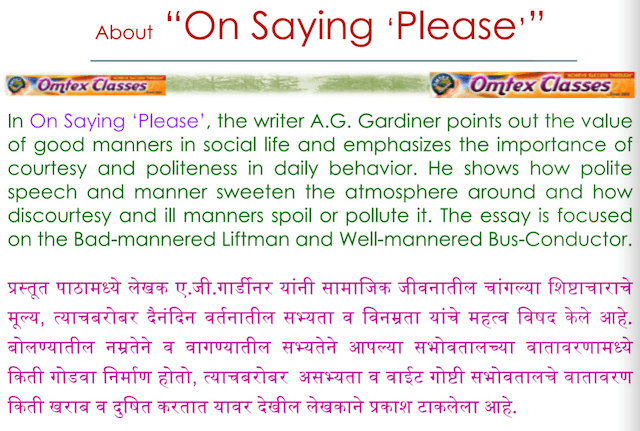 |
| Chapter 1.2: On Saying “Please” English Yuvakbharati |
.




